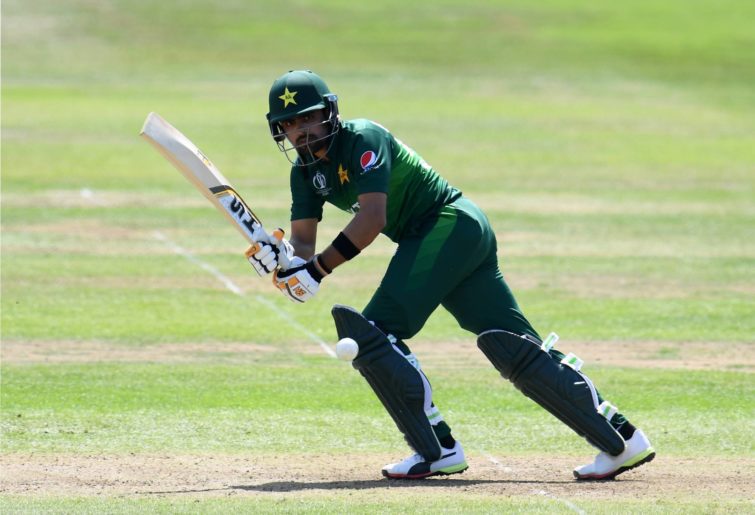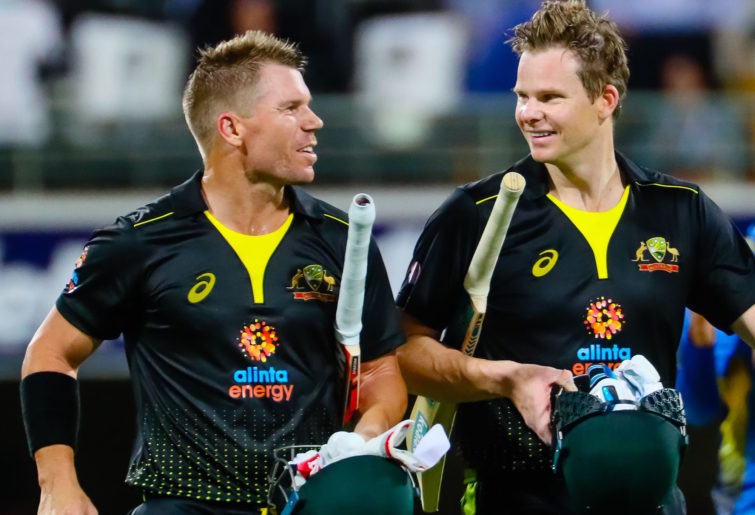WATCH: Cam Green soars with 'Go go Gadget' arms to take an IPL stunner
The Aussie needed every centimetre of his height and reach to reel that one in!
Opinion
Pakistan star Babar Azam may just be shaping the way Australia are aiming to win next year’s T20 World Cup.
Australia seem to have recalled Steve Smith to T20Is, after a three-year absence, in the hopes can emulate Babar, the world’s number one T20I batsman.
In a format dominated by sluggers who clear the ropes with ease, Babar is proof there remains a role in T20s for players who favour timing, placement and deft touch over brutality.
Similar to Smith, rarely does Babar obliterate a T20 attack. He leaves that task to his teammates while gluing his side’s innings together with composed knocks. Because of his consistency in anchoring an innings, Babar’s batting colleagues are offered licence to cut loose.
From 34 T20Is, Babar has made 1349 runs at 52, with a sedate scoring rate of 7.66 runs per over. He is remarkably consistent, having passed 30 in no less than 56 per cent of his career innings at international level.

(Harry Trump-IDI/IDI via Getty Images)
Babar’s slow rate of scoring is underlined by the fact that he’s scored at more than 9.3 runs per over in just 12 per cent of his innings.
I picked that 9.3 runs per over figure quite specifically because of the fact Australian stars Glenn Maxwell and Aaron Finch both boast career scoring rates of even higher than that.
Babar regularly cops criticism for this gentle pace of scoring. Pundits and fans have accused him of being too conservative, and of batting for his average rather than for his team. Surely, though, the proof of the pudding is in the eating?
Babar is the number one ranked T20I batsman in the world and Pakistan are the number one T20I side in the world. Pakistan have a commanding win-loss record of 24-9 when Babar is in their line-up.
During that period, Pakistan have not boasted another truly world-class T20I batsman – Babar has carried a heavy load.
Because he has so consistently crafted valuable if unspectacular innings, Pakistan have only needed fast-scoring cameos from two or three other players to set or chase a solid total. The quality and variety of their attack has meant Pakistan have not needed to aim for monster totals.
In the case of Australia, they may be able to accommodate the Babar-like scoring pace of Steve Smith (7.5 runs per over in T20Is), and benefit from his consistency, due to the blistering strike rates of the other members of their top four.
Maxwell (9.6 runs per over), Finch (9.44) and Warner (8.44) are three of the world’s quickest-scoring top-order T20 batsmen. That probably helps explain why the Australian selectors have chosen to combine them with Smith, rather than with a hitter such as D’Arcy Short or Chris Lynn.
Just like in ODIs, a T20I batting line-up requires balance. It is not just a case of picking your most dynamic batsmen and aiming for the moon. Pakistan have proven that.
This becomes even more relevant at the pointy end of T20 tournaments, when suffocating pressure makes free-wheeling batting even more difficult.
Look at the winning totals in the six T20 World Cup Finals: 5-157, 2-139, 3-148, 6-137, 4-134 and 6-161. When the heat is really on, chasing a total of 150 can suddenly feel like 200. Across the 12 team innings in those World Cup finals, only once has a side passed 160.
Australia probably feel that, not only do the scorching strike rates of Maxwell, Finch and Warner make room for Smith, but that he also offers them valuable insurance in the event of a collapse.

(Photo by PATRICK HAMILTON/AFP /AFP via Getty Images)
The powerful trio of Finch, Warner and Maxwell won’t be able to bully opposition attacks in every match.
Over the course of the next year, and during the T20 World Cup, there will be times when Australia will need a steady presence to guide them through an innings.
Smith has earned first crack at that role. Whether he can make it his own we will have to wait and see.
But with a prolonged run at this format over the next year, Smith can thrive. Many of his detractors point to his poor T20I career record (average of 24 at a scoring rate of 7.5 runs per over) as evidence he should not be getting this opportunity.
Yet Smith’s career T20I record is irrelevant. Of his 34 matches for Australia, 20 were played more than eight years ago. Smith’s batting record between the ages of 20 and 22, while playing as an all-rounder, are of zero value when assessing the merit of his present selection.
In the 14 T20Is Smith has played since then, he has been good, averaging 33 at a scoring rate of 8.12 runs per over.
I would argue that the best measure of his ability as a T20 player is his IPL record. Over the past eight years, Smith has very rarely played T20Is or BBL. So the IPL has represented the one period each year when he’s actually been focused on T20 cricket and been able to build some momentum in that format.
Smith’s IPL record is fantastic – across 81 matches he has averaged 37 at a scoring rate of 7.7 runs per over. Not only is that almost identical to the career IPL record of Virat Kohli (average of 37 at a scoring rate of 7.9), but Smith’s scoring rate is equal to Babar’s pace in T20Is (7.66 runs per over).
None of this guarantees the Aussie will be a success in T20Is. I’ve certainly doubted his value at times in the shortest format.
But Australia’s strategy in regards to Smith is clear and wise. If he can adapt to that role over the next year he will be the adhesive that binds Australia’s T20I batting line-up, just as Babar does for Pakistan.